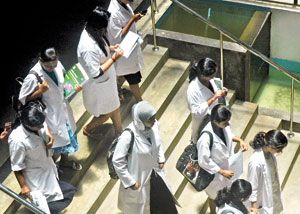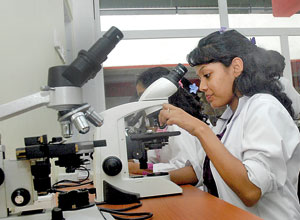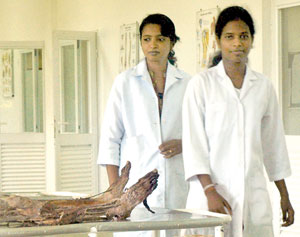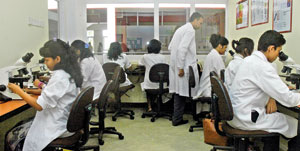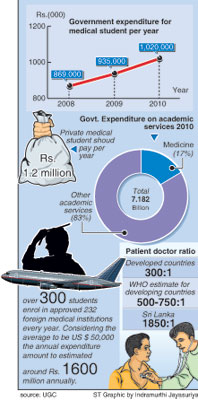The country’s sole private medical college, the South Asian Institute of Technology and Medicine, was set up two years ago and is already generating heated controversy.
On August 31, the Minister of Higher Education, S. B. Dissanayake, issued a gazette giving recognition to the private medical college in Malabe as a legitimate degree-awarding institute. It is entitled to award the degree of Bachelor of Medicine and the Bachelor of Surgery (MBBS).
The Government Medical Officers Association (GMOA) opposes the move, and was to stage an island-wide protest on Wednesday, but called off the protest when Minister of Health, Maitripala Sirisena, said he would appoint a five-member committee to look into issues relating to the private medical institute.
The Sri Lanka Medical Council, which oversees all aspects of government medical practice, is not happy about the Higher Education Minister’s decision.
Sri Lanka Medical Council registrar Dr. N. J. Nonis told the Sunday Times that the Ministry of Higher Education had not consulted the Medical Council or the Ministry of Health before giving the institute degree-awarding status.
“Under the Medical Ordinance, the Sri Lanka Medical Council should ascertain whether the institute is up to standard and in a position to award medical degrees. During our last visits, we voiced certain concerns. These concerns should have been addressed before the next step was taken,” he said.
Dr. Nonis said the South Asian Institute of Technology and Medicine was established two years ago but had still not commenced clinical studies for lack of a hospital of its own. “The institute has asked private hospitals to give their undergrads opportunities for clinical training. Patients who come to private hospitals expect special care,” he said.
Once the Medical Council is satisfied with the standards at the institute, it will submit a report to the Ministry of Health.
GMOA spokesman Dr. Upul Gunasekare said the association was not challenging the right for private medical colleges to operate; what it wanted was that standards be met and maintained.
“The country is suffering from a serious shortage of medical professionals. But this does not mean we can endorse sub-standard medical teaching institutes. We cannot put patients at risk,” he said.
The Medical Faculties Action Committee, comprising government medical students, claims that private colleges would take their toll on state-run medical teaching institutions.
“Medical students in the Rajarata and Eastern Provinces are seriously handicapped by a lack of resources. There’s a real danger that our best teachers will be enticed away by these private medical colleges with attractive salaries,” said Action Committee president Nilan Fernando.
According to Higher Education Minister S. B. Dissanayake, the University Grants Commission had made several visits to the South Asian Institute of Technology and Medicine and laid down conditions before approving the institute as a degree awarding institute, under the Universities Act.
Minister Dissanayake recalled how the late J. R. Jayewardene, as President and Higher Education Minister, issued a similar gazette when the North-Colombo Medical College (Ragama medical faculty) was set up. It became a degree-awarding institute even before the North-Colombo (Ragama) Teaching Hospital.
"The country is suffering from a serious shortage of medical professionals. But this does not mean we can endorse sub-standard medical teaching institutes. We cannot put patients at risk." - Dr. Upul Gunasekera, spokesman,
Government Medical Officers
Association
|
Later, following opposition, it was taken over by the state and is presently affiliated to Kelaniya University.
“The gazette says that clinical training should be conducted by the faculty in its own hospital or in agreement with other teaching hospitals, with the setting up of professorial units and adequate human resources.
“Financial capability was given special consideration and a loan has been obtained from a state bank for both the infrastructure facilities and the hospital, which costs around Rs. 2.8 billion,” he said.
The minister said a student from a rural area could enter the medical faculty with three simple passes at the Advanced Level, while Colombo and Kandy students have not been able to get places in a medical faculty with three A’s or two ‘A’s and a ‘B’.
“Parents are sending their children to countries like India, Bangladesh, Nepal, and even Russia and China to study medicine. There are some 100,000 students in international schools sitting for the London A/Ls,” he said.
A private medical institute would give these students an opportunity to work and serve the country, he added.
There are 38 overseas students studying at the medical college. Another 40 are the children of doctors serving in the government sector, and some are members of the GMOA.
Dr. Ravindra Ruberu. Secretary to the Minister of Health, told the Sunday Times that once the five-member committee is appointed, it will look at issues raised by the GMOA and the Medical Council.
“We have asked the institute to keep the latest intake on hold until the committee looks into certain issues and gets them sorted out.”
Meanwhile, Professor Neville Fernando, director of the South Asian Institute of Technology and Medicine, has extended an open invitation to the Minister of Health, the Sri Lanka Medical Council and other institutions and organisations to visit the teaching hospital and conduct inspections.
“There are some 250 students, and we are into our fifth intake. The fee is Rs. 6 million for the five-year course. We arrange for loan facilities and give scholarships to top scorers in the placement test. It would be much more expensive for a student to go to another country for a medical education.”
Prof. Fernando said the South Asian Institute of Technology and Medicine was building a private hospital with 1,200 beds. The hospital is being built with a state bank loan, and will be completed in 2012.
“Clinical training will begin in a few months. We have had discussions with a few private hospitals on the matter of clinical studies. We have complete laboratories and departments dedicated to anatomy, microbiology, biochemistry, parasitology, pathology and physiology, museums, tutorial rooms and lecture theatres, research units and auditoriums,” he said.
Since 2009, London A/L students following the London Edexcel or Cambridge curriculum in Sri Lanka could complete their university education here without going abroad. The medical degree is offered by the World Health Organisation-endorsed Nizhny Novgorod State Medical Academy, of the Russian Federation.
There are some 250 students, and we are into our fifth intake. The fee is Rs. 6 million for the five-year course. We arrange for loan facilities and give scholarships to top scorers in the placement test. It would be much more expensive for a student to go to another country for a medical education. - Professor Neville Fernando,
director,South Asian Institue of Technology and Medicine
|
Professor Malkanthi Chandrasekara is Vice-Chancellor of the South Asian Institute of Technology and Medicine. On the faculty are prominent medical personalities, such as Prof. Shanti Goonewardene, Prof. Hemantha Peiris, Prof. Ravindra Fernando, Dr. Nandalal Gunarathna, Prof. Sirimevan Widyasekara, Prof. Shriyani Ekanayake, Prof. Preethi Randeniya, and Prof. H. G. Nandadasa.
“If government doctors can engage in private practice, why can’t state institution academics on sabbatical leave and others teach our students while still working for state-sector faculties?” he questioned.
Dr. Terrance de Silva is president of the parents’ union of the South Asian Institute of Technology and Medicine, and a former deputy director-general of the Ministry of Health. He said many of the parents were well-known consultants and specialists in government hospitals.
“Every year, more than 300 students enroll in some of the 232 Sri Lanka Medical Council listed medical institutions to study medicine. Fees at these medical schools range from US$25,000 to US$250,000. If you calculate at an average US$50,000, the country is losing annually US$15 million a year,” he said.
The concept of private medical schools may be new to Sri Lanka, but it is not so in other countries. “The first private medical college in India was set up in 1953. Except for the Maldives, Sri Lanka is the only SAARC country without a private medical school,” he said.
STUDENTS HAPPY WITH SET-UP
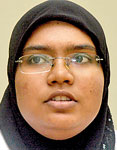 |
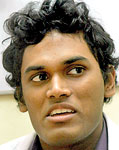 |
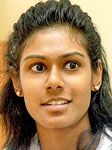 |
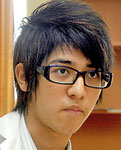 |
| Nishama Ali |
Thimal
Sumanasekare |
Nilukshi
Gumawardene |
Kaul Tillakeratne |
Maldivian medical student Nishama Ali, 21 years, said she learnt about the South Asian Institute of Technology and Medicine at an education fair in Maldives. “I chose to study in Sri Lanka because it is close to the Maldives and a lot of Maldivians study here. I am happy to be a medical student from Sri Lanka,”
Thimal Sumanasekare, 20, said, “My sister missed a place in the state medical faculty by a few points. She went to Bangladesh to study medicine, but encountered many difficulties there. So my parents decided to send me to this medical college. I see this institute as a blessing to Sri Lankans.”
Nilukshi Gumawardene, who is in her first semester, likes the mix of local and foreign students.
Kaul Tillakeratne, 20, said, “I’m half-Japanese, half-Sri Lankan. The laboratory and research facilities are like those in foreign medical colleges. My brother went to Singapore for higher studies, while I chose to study here.” |

